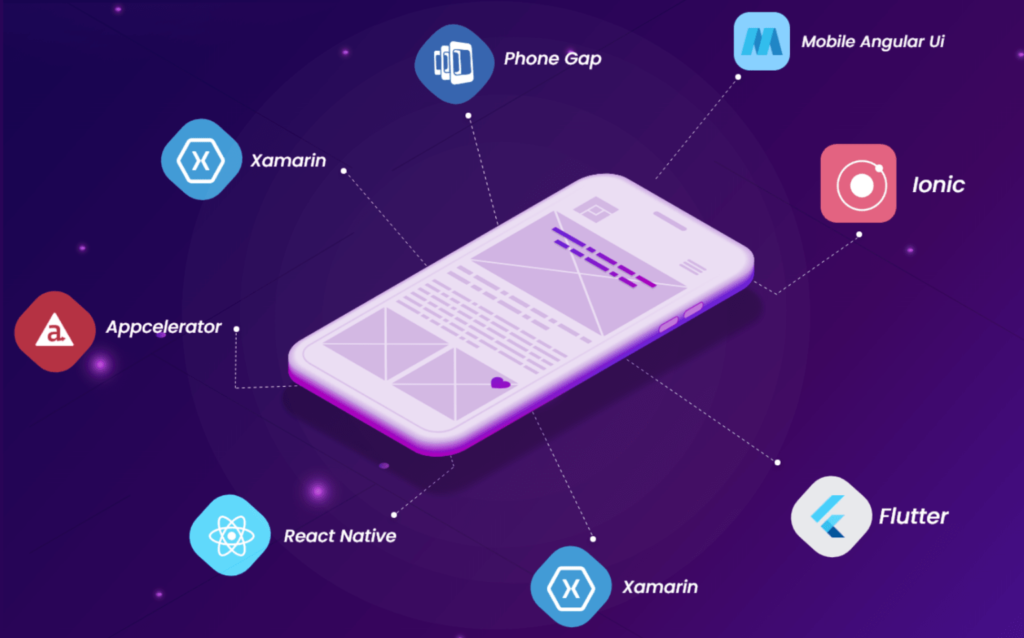If you are reading this, then it is highly likely that you are thinking about creating a presence for your Mobile App on multiple platforms. A cross-platform app, without a doubt, is the best option for startups and small to medium enterprises.
For a long time, we have utilized native development for different types of customized applications. However, the emergence of cross-platform development has allowed developers to make a shift and utilize tools like React Native or Flutter to develop Mobile App targeting multiple platforms from the single codebase.

When you have a ground-breaking idea, you need to advertise it through various platforms. While you can also select native app development, it takes a lot of time and requires separate resources and efforts for every platform. A cross-platform application allows startups and small to medium enterprises to re-size, scale, and improve their working model overtime.
In this article, we have discussed how cross-platform app development is beneficial for startups firms and small organizations.
What is a Cross-Platform App?
You may be wondering, what is a cross-platform application?
In the simplest language, a cross-platform application runs on more than one platform through one source code. It is possible to provide a native-like experience on particular platforms with a cross-platform application.
For example, one cross-platform application can function both on Android and iOS smartphones. There’s no need to produce two different source codes for this.
Why Do You Need a Cross-Platform Application?
Here are some dedicated reasons to choose cross-platform app development to improve your business presence online.
1. Quick Development
App development is not a simple and quick activity. You need time, skills, focus, ideas, and the right tools.
Contrary to this, startups and small to medium enterprises don’t have this time. They want their product, website, or online presence quickly. They need an application that they can launch in the market in the shortest time.
When you are making native applications for iOS and Android users, you need time; a lot of it. In cross-platform app development, you can create the application in much less time because you can use the single code base and target it for multiple platforms. The time freed up for the development can be utilized in new applications and cross-platform apps.
Overall, it is a winning situation for everybody: developers can reduce the development time by almost half and startups and small to medium enterprises can launch the product sooner than later.
If you look at it, then as a startups or small to medium organization with a restricted budget and limited resources, cross-platform development gives you invaluable benefits. You can reduce time, decrease costs, and improve resource utilization.
2. Reusable Codes
In cross-platform app development, code can be reused. In any application, code is the building block, which determines the app’s design and programming style.
Usually, you require too much code to build an application that is feature-rich. To offer this experience, your developers work hard and create a bug-free application.
However, if you don’t use a cross-platform application, then you need multiple development teams for each of the platforms you are targeting. Today, iOS and Android are the most popular platform, which means you need two development teams – twice the efforts are put if you target both the platforms.
When cross-platform app development tools were launched, this time-consuming task was eliminated. Now, developers can utilize the same reusable code for multiple applications. It is known that approximately 80% of the code can be reutilized in different applications. This eliminates repetitions and allows developers to save time.
Your cross-platform app development team also has the power to save these reusable code snippets in the library and keep using them over and over again; for as long as the code is relevant.
3. Lower Costs
There’s no doubt in the fact that cross-platform app development is cost-effective – exactly what startups and small to medium enterprises need.
The logic behind is simple, when you can use one application and run it on various operating systems, you are saving money and resources on the development front. Therefore, you are actually getting apps for multiple platforms in a much less amount when compared to native development.
4. Time-Efficient Testing
On every platform, your application has the same codebase, which means that you can make changes quickly and simply. You get the power to roll-out important updates to various platforms in one go. There’s no need to work on updates of different apps separately.
For this reason, cross-platform app development also allows quick patches and feature upgrades for iOS and Android versions.
When you utilize unit testing for cross-platform applications, you only need to write the test in common code one time. This code can be used for every platform on which your application will function. This not only saves your time but also resources.
5. No Need for Platform-Specific Features
Most of the mobile Apps today do not need to use platform specific features, which means that a cross-platform App will work for most of the use cases/business. Check the requirements of your App to decide, before you can decide to build seperate App for each platform.
Developing cross-platform applications doesn’t mean that you need to implement platform-specific features separately. You don’t need that, as cross-platform functions for many types of applications. Hence, you just have to develop one cross-platform app and utilize it for various platforms, such as Android and iOS.
A few games are an exception to this due to licensing requirements between game consoles and developers. Therefore, a cross-platform App might not be ideal for these cases.
Why Do Most Startups Choose Cross-Platform Over Native App Development?
Here are the top 7 reasons why startups generally prefer cross-platform app development over native app development, let’s check them out:
1. Multi-platform support
This is the most prominent feature of cross-platform: multi-platform support. As a startup, you certainly want your product or application to reach as many users as possible.
With cross-platform app development, it’s quite possible as it gives you the flexibility to launch your app on multiple platforms/ operating systems so that it becomes easier for the users to find your app be it any platform they are using: Android, iOS, Linux, and so on.
2. Perfect for releasing MVP (minimum viable product)
Technology experts always advise launching startups their MVP at first as it involves minimal risk factors. Startups have the advantage of cross-platform app development as it is known to be an ideal choice when it comes to minimum viable products.
Moreover, you can always add more features to your MVP to make it customized for users after a specific period of time by taking care of what your audience wants from your app.
Learn in detail about how Flutter is an ideal choice for MVP development
3. Customized experience with a simple backend architecture
Yet another reason why startups delightfully opt for cross-platform development is the flexibility it offers. Developers can offer a native experience with cross-platform app development, and that too with a simple backend architecture.
A ting of extra effort in creating a seamless design interface will result in a smooth user experience because of stunning UI design and functionality.
4. Easy to code
Cross-platform app development is highly popular due to its native-like-app experience regardless of its simple infrastructure.
It has come a long way as startups are enjoying its experience, and of course, they will, who would deny the option that allows you to cut short the process of coding every time you want to launch your product or app on a different operating system?
In a nutshell, cross-platform app development is a win-win solution for startups.
5. Oodles of development tools are available
Cross-platform app development is a vast concept. It has a large number of development tools and frameworks available like Flutter, React Native, Kotlin, Ionic, and so on, accessible to be used.
With these tools and frameworks, developers can create stunning UI designs keeping the app’s functionality smooth with the help of available toolkits. So, cross-platform app development becomes comparatively easier than native one.
6. Cross-platform apps can be upgraded easily and quickly
Cross-platform apps are quite easy to upgrade due to their speed and usability. The development tools of cross-platform have a major contribution as they allow the apps to translate the code in a pretty simple way. This also guarantees that the program is updated automatically through the internet.
7. Simple integration
This is the second big reason behind the popularity of cross-platform applications in the IT industry. Cross-platform apps are easily able to be integrated with other apps.
As cross-platform apps effortlessly associate with the device’s framework climate, customers do not get to experience the smallest of creaks thus they get to obtain a fruitful and smooth experience.
Top 3 Best Cross-platform App Development Frameworks
These are the top 5 cross-platform app development frameworks that have been widely used in this whole year 2022 so far:
Flutter
Flutter is the creation of Google and it has achieved great success and praise in such a short period of time. Recently, Google has gifted yet another solid upgraded version of Flutter which is Flutter 3 which is already winning hearts in the IT industry.
Flutter merges the plus points of both cross-platform and native approaches, which have been relished by many giant labels like Alibaba, Hamilton, Phillips, Hue, Dixie Group, and other popular businesses.
React Native
React Native is launched by Facebook that is eligible for supporting operating systems like iOS, macOS, Apple tvOS, Android tvOS, Android, Android TV, Web Windows, Web, and UWP. With this cross-platform framework, you are allowed to offer equally awesome experiences.
Moreover, this technology also allows you to work with the React library outside the browser in order to develop native applications with full access to system API platforms.
You can also refer to this article if you are confused about choosing between React Native and Flutter.


